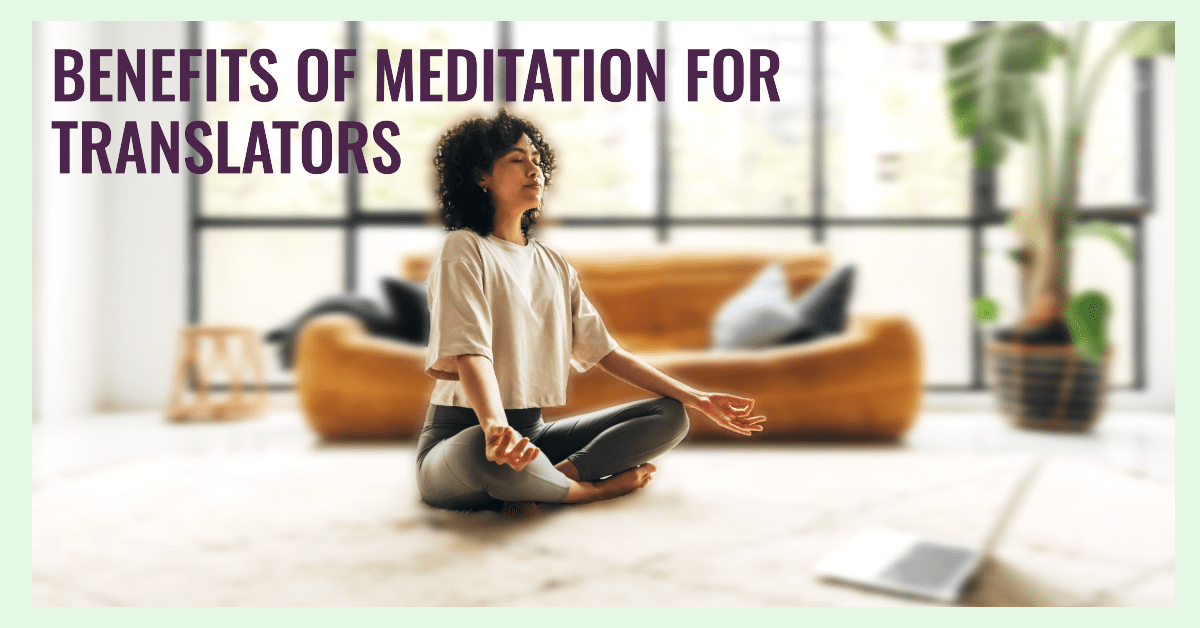How Meditation Makes My Translator Job Better
To be honest, the world of translation can be pretty hectic.
Between tight deadlines and complex texts translation, it’s easy to feel overwhelmed at times.
Through a friend’s recommendation, I stumbled upon meditation.
Ever since, it has became my go-to routine for staying calm, focused, and creative in my work.
In this article, I want to share how meditation has transformed my translation experience for the better.
Importance of Mental Wellness for Translators
As translators, we have the important job of connecting people through language.
But let’s be real: at times, this job can be overwhelming!
Through my personal experience, I have learnt that taking care of my mental wellness is crucial for staying sharp and producing high-quality work.
When I prioritise my mental health, I notice a big difference in how I approach my projects and interaction with my colleagues and clients.
Meditation has been a game-changer for me, helping me boost my focus, creativity, and both my mental and emotional resilience when challenges arise.

Benefits of Meditation for Translators
Here are some benefits that I reap while working on my meditation routine daily.
Of course, some of us will experience more benefits than what is mentioned here.
#1. Stress Reduction
One of the first things I noticed when I started meditating was how much it helped reduce my stress levels.
There were days when deadlines felt like they were closing in on me.
But after just a few minutes of meditation, I felt a wave of calm and inner peace wash over me.
Research shows that practicing mindfulness can lower cortisol levels—the stress hormone—and I can definitely vouch for that!
#2. Enhancing Focus and Concentration
Meditation has really sharpened my ability to concentrate on my current tasks wholeheartedly.
Before, I would often find myself distracted by notifications or random thoughts chattering in my mind while translating.
Now, after practicing mindfulness, I can dive into my work with laser-like focus.
For instance, during a recent project with a particularly dense legal document, I was able to maintain my concentration for longer periods without getting sidetracked.
#3. Improving Emotional Well Being
I have also seen a positive shift in my emotional well-being since incorporating meditation into my routine.
There were times when I felt anxious about meeting client expectations or worried about making mistakes.
Through meditation, I have learned to manage those feelings better.
Nowadays, I approach my work with a more positive mindset, which not only boosts my confidence but also enhances the quality of my translations.
#4. Cognitive Clarity
Meditation has helped clear the mental fog that sometimes clouds my thinking.
It’s like giving my brain a refreshing reboot!
When tackling complex texts, having clear cognitive function is essential.
After meditating, I find that I can remember terminology better and resolve translation challenges more easily.
#5. Increasing Creativity
One of the most exciting benefits has been an increase in creativity.
Translating isn’t just about converting words into other languages; it’s about finding the right expressions that resonate and localise with different cultures.
Sometimes, when I’m stuck on how to phrase something perfectly, a few minutes of mindfulness can bring inner calm and spark new ideas and perspectives that lead to creative solutions.
#6. Embracing the Present Moment
Lately, I have focused on being fully present at the now.
In our fast-paced world, it’s easy to get lost in thoughts about the past or future.
By taking a deep breath and having a greater awarenss of my surroundings, I appreciate the warmth of the sun, the chirping of birds every morning, and the joy of a warm cup of coffee.
This awareness has transformed my experiences, allowing me to connect deeply with others and find peace in everyday moments.
Life feels richer when I embrace the now, reminding me that this moment is all we truly have.

Tips to Integrate Meditation into Your Routine
1. Set Aside Time Daily
I have made it a habit to set aside time each day for meditation—usually in the morning before diving into work or in the evening to unwind. Even just 10-15 minutes makes a big difference! It helps me start or end my day on a calm note.
2. Find Your Zen Spot
Find a quiet place where you can relax and focus. It could be a cozy corner in your home or a peaceful outdoor spot.
3. Use Guided Meditations
When I first started meditating, guided sessions were greatly helpful for me. There are so many apps out there that offer guided meditations tailored for stress relief or focus enhancement. Listening to someone else guide me through the process made it easier to get into the right mindset.
4. Practice Mindful Breathing
Mindful breathing is one of the simplest forms of meditation that I’ve integrated into my daily routine. Whenever I feel overwhelmed during my translation work, I take a moment to focus on my breath—deep inhalation into my heart zone and slow and longer exhalation—it grounds me instantly.
5. Incorporate Short Breaks
I have also started using techniques like the Pomodoro Technique—working in focused bursts followed by short breaks—to help maintain my energy levels throughout the day. During these breaks, I’ll take a few minutes to meditate or practice mindful breathing to recharge before jumping back into work.
Meditation is a Way of Life
Incorporating meditation into my routine has truly transformed how I approach my work as a translator and also in my daily interactions.
From reducing stress to enhancing focus and creativity, it serves as an invaluable tool in navigating the complexities of translation tasks.
By prioritising mental wellness through practices like meditation, I have not only improved the quality of my translations but also enriched my overall experience in this rewarding profession and led to greater success in my translation career.
Hope that you can share with us on your new found journey after having started on meditation or already practising meditation as your daily routine.
Reference:
https://www.virtualvocations.com/blog/telecommuting-survival/meditation-benefits-remote-workers/




